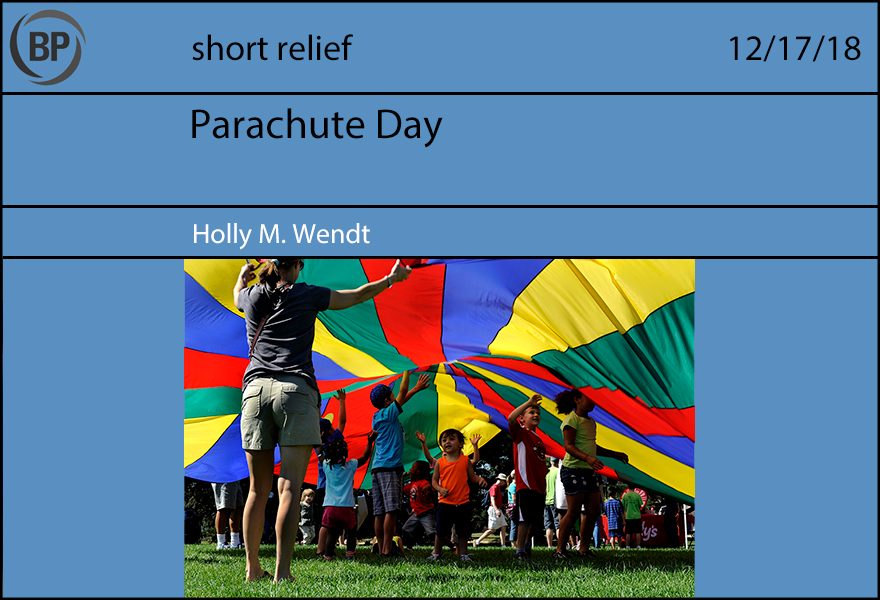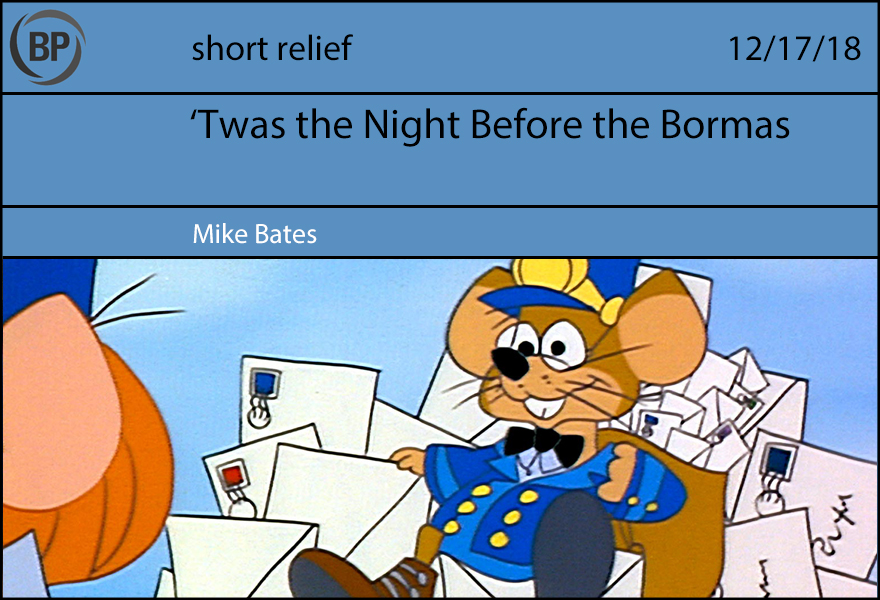
The thing about parachute day was that you never knew it was coming. An elementary school gym class would simply arrive to the boxy combination gymnasium/auditorium and there it would be: a massive circle of silk as bright as a circus tent, making even the glare from the industrial fluorescent lights in their basketball-proof wire cages look warm. And the children—oh, the children would go bonkers.
Or at least I did. Parachute day was my favorite day in gym class, which was somewhat strange. I loved competitions and I’d had my last growth spurts early. In elementary school, I was tall and fast and took pleasure in keeping score. But there was no competition in parachute day. There weren’t really even games.
What did we do with it? Notably, the class would ring its sleeping form and each set of small hands would take up an edge, evenly spaced. Together, we lifted it up. Together, we put it down. And then, together, we shook that sectioned silk like hell. Billowing hills and soft valleys arced and the fabric spoke its hush and whisper. Then Mr. W tossed a tennis ball onto the surface. The ball leapt and arced, though I don’t remember us trying particularly hard to do anything with the ball—either to keep it on the parachute or buck it off. The pleasure was simpler: yellow ball, bouncing; purple and red cloth, shimmering. Then he poured a whole bucket of tennis balls onto the surface and the point was popcorn, if popcorn can be a point.
I don’t know how a parachute ended up in gym classes, though apparently it’s a common thing, and no one ever explained where the concept came from or who first cut away all of the cords and straps that would make a parachute complete its proper function and then gave the thing to kids.
Why am I thinking about this now? I suppose it’s because it’s winter, and parachute day always happened in the winter, or because it’s the holiday season and nothing, in the parameters of gym class, was more festive than parachute day. It wasn’t framed as a holiday treat, though. It felt more arbitrary: whenever the consecutive days of sleet were too many, whenever indoor kickball went stale, whenever dodgeball took on a caged and biting snap. We didn’t play baseball or softball in gym class, not until fifth grade; I don’t think we even hit off tees, though it would have been a perfect activity for those cold, shut-in days. There was some wiffleball, though not very often; the balls cracked too easily, the bats bent. But maybe we could have imagined the lights we had as something else, as big stadium banks left, right, and center. The rules for hitting the ceiling, what was playable and not, were easy enough to devise. But the big square space never tempted me to think dome or stadium or anything so magical. No, that happened only on parachute day, on the last thing—always the last thing—we did with it.
With the all the coordination we could muster, we heaved the parachute up and, with the particolored bowl above us, we turned and slipped beneath it, each sitting on their edge to trap the air. I remember no tranquility better than this as a child: soft, multicolored light, the experience sweeter because it couldn’t last, the unexpected hush that came over us. And I remember the disappointment after: once parachute day had happened, it wouldn’t happen again that year. Like Christmas, or like the day your favorite baseball team makes a move that prompts you to think this is it; this is the one we’ve been waiting for.
In the chill damp of the offseason, though, it’s impossible to know when that day is coming, but, unlike parachute day, there might be the hope that it could happen more than once.

If you want to understand who I was a kid back in the 1980s, all you need to know is this: at a time when my peers were debating the merits of Guns ‘n Roses’ Appetite for Destruction vs. Metallica’s …And Justice For All, my favorite cassette was The WGN Radio Cubs Party Album. Because who needs friends when you can spend 162 days watching Jamie Moyer?
Last summer, I discovered to my great delight that someone had uploaded the soundtrack to my youth onto Youtube. So let’s take a look back at the tracks that I played on my stereo every day from 1987 onward…
“Hey Hey, Holy Mackerel:” (1:46) The theme song of the 1969 Cubs repeatedly proclaims “The Cubs are on their way!” Unfortunately, the lesson that year was “If you don’t specify where, the Cubs will assume you mean second place.” In the cruelest of ironies, this song played in Chicago past the end of September. The Cubs didn’t.
“Men in Blue:” (3:46) In the magical season of 1984, several members of the Cubs recorded a song about winning the championship. And the result sounded like the answer to the question: “What if you made the entire ‘Super Bowl Shuffle’ out of the verse where the back-up quarterback tries to rap?”
The anthem’s nadir is the moment where Leon Durham sings “There’s been a lot of talk about the lights at Wrigley Park…” Making this the first fight song in sports history where a player forgets the name of his own stadium. There can be only one explanation. “Men in Blue” was written by Jeff Gordon.
“Here Come the Cubs:” (8:37) In the mid-80s, The Beach Boys kicked Brian Wilson out of the band and added John Stamos. Then they recorded this song in 1987 to make that trade look like the highlight of the decade.
The jingle begins by replacing the lyrics to “Barbara Ann” with “Cubs, Cubs, Cubs, Here come the Cubs…” So it was appropriate that a song about desperately trying to get to first base would be re-written for a team that gave 121 plate appearances to Chico Walker.
Even if you included “Kokomo,” this had to be the single worst thing The Beach Boys had ever done…
“Cubby Safari:” (10:50) I stand corrected.
“Go Cubs Go:” (12:47) A while back, Rolling Stone attempted to compile The 500 Greatest Songs of All Time. Thousands upon thousands of words were spilled trying to determine a definitive ranking of masterworks by Prince, The Beatles, Aretha, Dylan, and Springsteen when all they needed to say was this…
Once the Wrigley Field sound system plays “Go Cubs Go,” nothing bad will happen for the rest of the day.
“Like a Rolling Stone” can suck it.
“Take Me Out to the Ballgame:” (18:39) If it means getting to listen to Harry Caray one more time, this entire album was worth it. 10/10.

‘Twas the night before the Winter Meetings when all through the league, We were waiting to find out who’d get Yasiel Puig. The White Sox were hanging back looking to sign, Bryce and/or Manny, the top of the line. Dipoto was nestled in his hospital bed, Making calls to trade his new first baseman, Ed. Cleveland had finished redesigning their cap, And Oakland waited to see who’d fall into its lap. As one deal completed there arose such a clatter, Yandy Diaz to Tampa was served on a platter. Away to Twitter beat writers flew in a flash! A three-team trade! One that included some cash! The Meetings had dragged on in the hot desert sun, But the biggest circus had not yet begun. For what to my wondering eyes did appear, But a scrum of reporters for the event of the year. They gathered ‘round someone, the crowd was so vast, That I knew in an instant it must be Boras. Flying in from all over the questions, they came, And of his clients, he made sure to drop every name. “Someone sign Marwin. Someone Moustakas. Someone sign Boxberger, Britton, and Dallas. The market is weak. There must be an occlusion, It better get moving or I’ll sue for collusion!” The dry winds had carried him up to a meeting, With the D-Backs Mike Hazen, whose cashflow was fleeting. Then on to the Phillies, who were willing to spend And whose will, he figured he could probably bend. But no deal! And so many others were acting aloof, As if their budgets had a hard and fast roof. The league was raking in money from everywhere ‘round, But the luxury tax forced everyone to go to ground. He was wearing a dress shirt and a pullover, black, And he wasn’t prepared to cut teams any slack. A book full of facts he had on each client, On how they’d be a great Yankee, or Dodger, or Giant. His eyes, how they burned, his cheeks how they flushed, His free agents had hopes and those were being crushed. His mouth opened wide and spewed forth invective, About how the CBA was so awfully defective. The bulge of a phone was seen in his breast pocket, And it was low on juice; he needed a socket. And “A charger, does anyone have a charger?” he said, “My phone’s battery is about to go dead!” “I’ve been on it all day, and been on it all night, Say, have we discussed Yusei Kikuchi’s future? It’s bright!” And a wink of a his eye and a twist of his head, Gave indication his client expected some bread. He spoke so many words; and extolled on his works, But the front offices were now manned by impossible jerks. He ended, as always, by admitting to, Advocating zealously for his clients, as good agents do. He pushed through the scrum and to the elevator, And promised he’d follow up with us all later. And I heard him exclaim as shut did the door, “Sign Bryce Harper as part of your championship core!”
Thank you for reading
This is a free article. If you enjoyed it, consider subscribing to Baseball Prospectus. Subscriptions support ongoing public baseball research and analysis in an increasingly proprietary environment.
Subscribe now